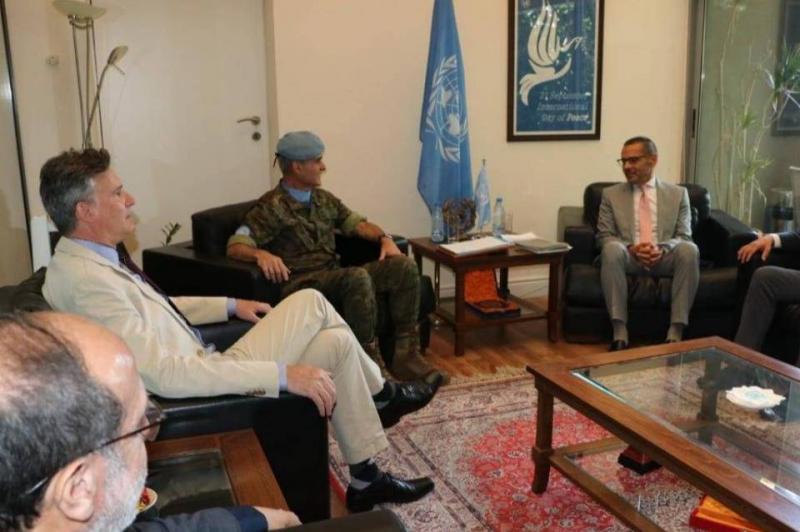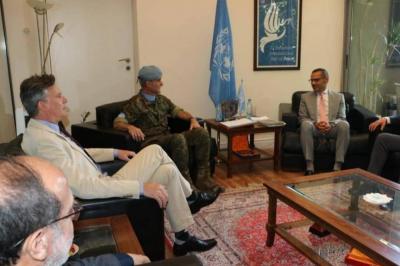The Foreign Affairs Committee of the Parliament, led by MP Fadi Markah, visited the UNIFIL headquarters in Naqoura. The parliamentary delegation arrived amidst the sound of sirens that echoed in the international headquarters following the sounds of explosions and Israeli shelling at the border with Palestine. They were received by UNIFIL Commander General Ardalo Latharo and senior officers who welcomed the delegation and held a closed meeting to discuss UNIFIL's role and tasks in these current circumstances, nearing the renewal of UNIFIL for another year.
After signing the guest book, MP Markah delivered a speech in which he stated that "Lebanon does not want war; it wants the implementation of international resolutions. Our visit today as a Committee for Foreign Affairs and Expatriates in Parliament is not the first to southern Lebanon to meet with you, but it comes today coinciding with the continuation of Israeli aggressions against Lebanon on one hand, and on the other hand with the upcoming renewal of UNIFIL's mandate to continue its humanitarian mission across nations, which has seen soldiers dedicate themselves to the task of making peace and exerting every effort to achieve it, offering sacrifices in the process among soldiers and peacekeepers over the years. Today, more than ever, we reaffirm the need for your role. UNIFIL has successfully woven distinctive relationships in the southern villages with civil associations, municipalities, and residents who maintain a relationship of gratitude and affection with the leadership of the forces present here and their members."
Markah added, "The people of the South and all Lebanese are keen to maintain this relationship, especially with the upcoming renewal of the peacekeeping forces following the escalation of Israeli aggressive actions and continuous violations of resolution 1701 over the past years through thousands of air sorties, land, air and sea violations, and the kidnapping of Lebanese farmers, among many other aggressions documented in reports issued by the United Nations. We have witnessed explosive violations through daily aggressions on many areas; in fact, these aggressions resemble war, with the Israeli enemy not adhering to international humanitarian law. The pattern of its aggressions against civilians, paramedics, and journalists continues, including the use of incendiary and prohibited phosphorous bombs. You must notice it daily as Israel spared no effort in targeting human beings and infrastructure, in addition to the destruction of homes and economic and commercial institutions."
Markah confirmed Lebanon's "complete and clear cooperation with you to implement resolution 1701, which forms a means to calm down and stop the war on Gaza. We address General Latharo on behalf of the Foreign Affairs and Expatriates Committee, thanking you for your warm reception and efforts in completing this visit, and I renew my greetings to you and those working in the peacekeeping forces, wishing you success in your noble mission to achieve the peace we aspire to while safeguarding Lebanon's sovereignty and borders."
Candice Ardilama, the spokesperson for UNIFIL, stated: "This visit is significant as it demonstrates the importance of the work that UNIFIL is doing towards the Lebanese government. Recently, the government requested the UN Security Council to renew our mandate for another year, which underscores our significance in providing the benefits that peacekeeping forces bring to local communities in southern Lebanon, along with the security and stability they provide. We have informed both parties, the Lebanese and Israeli authorities, that resolution 1701 is the appropriate framework to move towards a permanent political and diplomatic solution. Therefore, this visit is part of supporting resolution 1701."
She noted that "the situation in the South today is tense, and this has been repeated many times since October 8. We have witnessed periods of intense tension, with some days being quieter. However, today we are seeing some violent exchanges of fire. We continue to work through our liaison and coordination mechanisms, speaking to authorities on both sides of the blue line to urge them to return to a cessation of hostilities and to encourage all active parties to lay down their arms so that we can proceed through resolution 1701, within the framework of a ceasefire towards a political and diplomatic solution that restores long-term stability to southern Lebanon."




